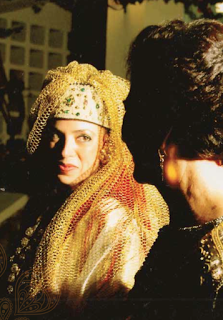
Eloquent article in Lilith magazine by a Sephardi Jew from Spanish-speaking Morocco about her ‘identity crisis’, caused by speaking too many European languages. One detects more than a hint of post-colonial guilt here, yet multilingualism has long been a component of Jewish identity in Arab countries. (Not a few Moroccan Muslims of a certain age and class also speak French – does that make them less Moroccan?) Yaelle Azagury feels closer to an Arab from Morocco than to a Jew from the US, but it is doubtful whether that closeness would be reciprocated.
I feel closer to an Arab from Morocco than to a Jew from Brooklyn or Boston.
My mother is a Moroccan Jew, born and bred in Tangier, where she also spent most of her life. Her words rang clear as I asked her to leave Morocco for the United States, where I have lived for 18 years. Although she no longer has any relatives in Morocco, I doubted she would ever settle in the manicured and uneventful Connecticut suburb where I live with my family.
Being Sephardi means something powerful to my mother: a kinship of spirit rooted in the Mediterranean, a shared grammar of tastes, flavors, sounds and idioms, a vocabulary of cultural and regional affinities threaded together bit by bit through the centuries. For her it is a complex closeness with Arab and Spanish cultures. It is less so for me.
I used to envy her the emotional clarity about her identity I lack. Morocco is her country. I, on the other hand, left when I was 18 to study in France, and I never came back. She grew up in a thriving Jewish community in the 1940s, I in a waning one in the 1970s. I felt in exile before I had even left. It was a time when almost all Jews had left their homes in Arab countries for France, Spain or Venezuela, incited by subtle economic pressures to depart.
For years, I looked towards France, where I went to pursue my literary studies. My touchstone references were Voltaire, Hugo, Baudelaire. I wrote a dissertation on Marcel Proust and became a French teacher, effortlessly passing for French. Although I am a descendant of the well-regarded Toledano family (Rabbi Daniel Toledano was a sage who lived in Fez in the 16th-century after his family was expelled from Spain in 1492), I viewed my Castilian ancestry as a distant origin, an appendix to myself. Even though colonial times were long bygone, I, a native of Tangier, was a pure product of French education, and my alienation ran so deep that I looked at my non-Gallic being with wariness. From Albert Memmi’s brilliant analysis of the colonized self, I knew that “Portrait of the Colonized,” c’est moi!
Like Memmi — a Jew of Tunisian origins — I spoke multiple languages, but this was no mere useful multilingualism. It was confusing and alienating. Each language came with a price. It was a Mephistophelian bargain. French — the tongue of thought and flight — ranked high on the list. By contrast, Arabic was low, the locus of backwardness and deficiency. We did not speak it at home, though I later learned it at school in its “high” form — “Fusha,” or classical Arabic — versus the “Darija” spoken by most Moroccans. Instead, at home we used Spanish, but that too came with strings attached. There was “high” Spanish, with its soft Castilian inflections, and our own hybrid form, Haketia, which was the vernacular of Moroccan Jews from the North, and a byproduct of another exile, 1492. Preserved through the centuries like a jar of marmalade, it consists of Old Spanish, with accretions from Hebrew and Arabic.

Leave a Reply